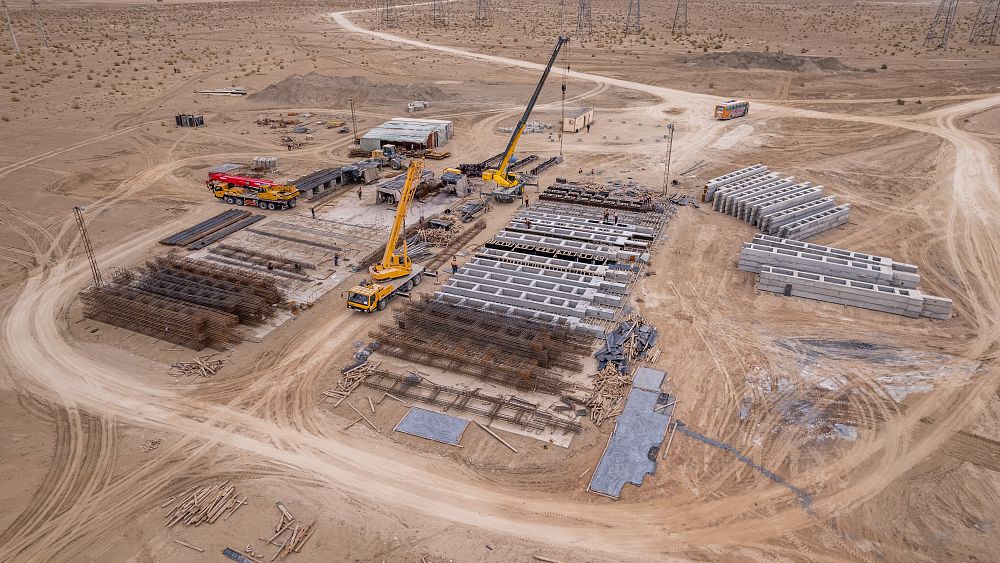
Uzbekistan’s expansion into a major global player in chemicals and gas is one step closer to fruition.
As the Ministry of Energy sets its sights on diversifying the nation’s economy and moving away from being a net importer of commodities such as polymer products, the Gas Chemical Complex MTO is at the heart of the move.
The $3.7 billion complex in Karakul, Bukhara, spans 225 hectares and will produce 1.1 million tonnes of polymer materials when it opens in 2025.
It will manufacture polypropylene, low- and high-density polyethylene, ethylene vinyl acetate and polyethylene terephthalate – it will be the first time the nation has produced the last three.
It will do so by using lean natural gas from the Mubarek fields that will be fed through cutting-edge processing plants before being turned into the high-value polymers.
Solar panels, car parts, footwear, sports equipment, pipes, fittings, furniture, helmets, food packaging and flooring are just some of the everyday products created using them.
It will generate enough raw materials to meet the domestic demand and greatly reduce the need to import similar products.
The plant’s production will boost supplies across multiple industries, including agriculture, textile, parapharmaceuticals, electrical engineering and automotive.
The complex – which has an estimated 25-year lifetime, creating 2,000 jobs directly and over 10 000 indirectly in the Bukhara region alone, generating $14 billion of tax for the government – has also signed an agreement with American company Air Products to build a methanol production facility.
It will be called Methanol Island and be able to produce 1.34 million tonnes every year.
The methanol facility will ensure the sustainable supply of methanol, hydrogen and other industrial gases such as oxygen and nitrogen, which are essential for the MTO gas chemical complex’s production processes.
Masrur Shakirov, General Director of the Gas Chemical Complex MTO, said: “We are delighted to be working with Air Products, the world’s leading industrial gases company, as partners in the complex.
“Air Products has established itself as a reliable supplier of proven solutions that can guarantee us both the high quality and required volume of products we need. “Air Products’ investments highlight the degree of interest shown by international companies in Uzbekistan’s industrial development opportunities.”
As well as the American firm, the complex is working closely with a string of international corporations including John Wood Group (UK), Hyundai (South Korea), Sinopec (China), Topsoe (Denmark), Lummus Technology (the Netherlands) and Versalis (Italy) during the development.
GCC MTO is owned by Saneg, the largest private oil and gas company in Uzbekistan. Bakhtiyor Fazylov, Chairman of the Management Board of Saneg, said: “After commissioning in full, the GCC MTO complex will play a fundamental role in transforming the economic potential of Uzbekistan. This facility will contribute to the development of new industries for the production of high-value-added products, creating thousands of skilled jobs throughout Uzbekistan.”
One of the main aims of the project is to reduce the negative impact on the environment by using the best available technologies and equipment – and moving away from traditionally coal-powered MTO plants.
In line with its Eco-goals, staff at the complex volunteered in a two-day clean-up project to mark World Environment Day this month.
Dozens of members – including senior members of management from its head office in Tashkent and employees on the ground in Karakul – headed to Charvak Reservoir, Bostanlyk, as well as the historical “Ancient Paykent” monument in Bukhara.
In just two days, volunteers collected more than 200kg of rubbish and discarded items left behind at the popular tourist spots.
Recyclable items were sent for further processing, as Artem Ushakov, Gas Chemical Complex MTO ESG Manager, said: “Such one-time actions certainly have a positive effect on the environmental situation, but we must keep in mind that this is only a temporary solution”.
“It is vitally important for all of us to make it a rule to treat nature with care, handle waste in responsible way, sort garbage and do everything possible to recycle it”.
“It is how we treat the environment today that shapes not only our lives, but also the future of our children and grandchildren.”
With global industrial giants watching, Uzbekistan is braced to build a thriving, and greener, chemicals economy.

